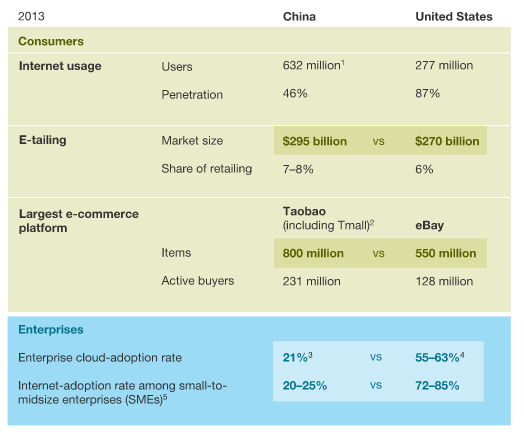China's coming internet revolution
One of the often repeated mantras about China is that the country's economic model, which has served it well in the past, is now broken and the world's largest economy needs to find a new engine of growth. China's growth model has long been driven by exports and investment. Both engines are still incredibly important but not sustainable.
Where does China find new sources of growth? There are plenty of areas where China can make considerable improvements. China's GDP per worker is only 17 per cent of America's. The long awaited state-owned enterprises reform has the potential to add trillions to the economy.
However, the most promising and dynamic area of future growth is the country's internet sector. The spectacular debut of the Chinese e-commerce giant Alibaba is just one example of the dynamism of the sector.
In some aspects, China's internet market already rivals, or is even larger than the US. For example, the country has 632 million internet users, twice the size of the US. The total market size of e-commerce in China is $295 billion, larger than the US' $270bn. In addition, e-commerce as a proportion of the retail market is also larger than the US.
At the company level, Alibaba has 231 million active users compared to eBay's 128 million. The Chinese company also sold more goods than eBay and Amazon combined. There's some food for thought.
However, Chinese companies lag significantly behind their American peers in terms of using the internet to run key aspects of their business. For example, the enterprise cloud-adoption rate is only 21 per cent in China compared to 55 to 63 per cent in the US, according to McKinsey Global Institute. The internet adoption rate among Chinese small to medium size enterprises is less than one third of the US.

This large gap between China and the US has the potential to become an important source of growth for the Chinese economy, according to a new McKinsey Global Institute report. “China's companies are quickly climbing the adoption curve. Their increased digital engagement will not only give the economy a new burst of momentum but also change the nature of growth,” says the report.
The strategy firm estimates internet adoption could add four to 14 trillion yuan to GDP by 2025, when China is expected to overtake the US as the world's largest economy. The internet industry is also expected to contribute 7 to 22 per cent of total GDP growth from 2013 to 2025. By comparison, fixed asset investment contributes about half of total GDP growth in China.
The fast adoption of internet technology can revolutionise the economy in many ways. One area that is ripe for change is the financial services sector, which has been dominated by stagnant state-owned banks. The growing use of internet platforms, big data and better analytical tools can help banks better assess risks and allocate credit.
A good example is lending to the SME sector. Chinese banks can access ever growing data about companies and they can use new analytical tools to better assess risks and reduce incidence of under performing loans.
In the area of consumer credit, a relatively underdeveloped sector in China, companies like Alibaba and Tencent are taking advantage of their massive data banks of hundreds of millions of users. Alibaba is making millions of small loans to their clients using their vast holdings of online transaction data. One of the stated ambitions of Jack Ma is to build a culture of credit in the country.
“Our research suggests that better risk management could create the greatest amount of additional value in China's financial services,” says the McKinsey report.
Traditional sectors such as the automobile and chemical industries are increasingly looking to the internet as a new source of productivity increases as they deal with the problems of over capacity and subdued demand. SAIC Motor, one of the largest carmakers in the country, is adopting internet based solutions to improve efficiency in its logistics chains. Chemical makers in the agricultural sector are also using big data to help farmers monitor crop conditions, tailoring their products to farmers.
The internet is also lowering entry barriers across many sectors. Internet-based platforms are disrupting many brick and mortar based traditional models, giving power to smaller but more digitally savvy players. In China, businesses with less than 1000 employees contribute 70 per cent of GDP. By adopting internet technology, many of these companies can improve their productivity even without the advantage of having deep pockets.
One of China's most powerful media moguls, Wang Zhongjun, said the internet offered a rare opportunity for young people to rival established tycoons within a short period of time. Despite Beijing's censorship and interference, the internet sector is relatively free from entrenched state players.
Though the country is besieged by a slew of challenges from dealing with growing debt to excess capacity, the booming internet sector is the silver lining to the gathering dark cloud over the world's second-largest economy.
















